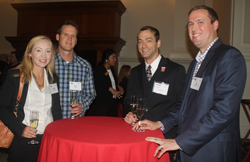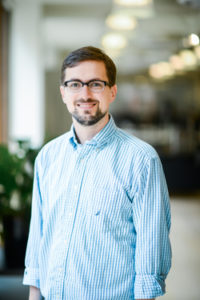College roommates and fellow computer science majors Ben Darnell ’02 and Mark Voelker ’02 recently crossed paths within the open source software industry. Longtime open source enthusiasts, both have established themselves as significant contributors in this realm: Darnell as co-founder and chief technology officer of startup Cockroach Labs, and Voelker as chief OpenStack architect at VMware, a publicly-traded global virtualization technology company.

OpenStack, one of the world’s largest open source software projects, allows companies of all sizes to build their own cloud computing platforms or consume public or managed clouds that others have built. An active member of the OpenStack community since 2011, Voelker chairs a committee that develops interoperability guidelines for the many products built on OpenStack, ensuring that users have choice in how they use the software.
In May, Voelker participated in a keynote demonstration at the OpenStack Summit in Boston, addressing a crowd of more than 5,000 conference attendees. As cloud computing takes over the software world, companies often spread their websites and critical systems across multiple clouds to increase scalability and reduce single points of failure. During the summit, Voelker and others led a live demonstration of a common software workload being deployed unmodified on various OpenStack-powered products all over the planet. At the core of this demonstration was Cockroach Labs’ unique new, globally-distributed database, CockroachDB, which reached its milestone 1.0 release that week.
Darnell said he and his Cockroach Labs co-founders conceived of CockroachDB while working together on a previous startup. Dissatisfied with other database options, they began developing CockroachDB as a solution to the data problems many startup teams were encountering.
“Now I’m the CTO, overseeing the technical aspects of development – reviewing designs, code, etc. – and working on our consensus and transactional protocols that ensure data consistency,” explained Darnell, who launched his career as an early employee of Google.
Reflecting on their college years – when Darnell and Voelker were among the minority of students running Linux as their primary desktop operating system – they noted that NC State had a strong community of like-minded open source software enthusiasts who were willing to help one another.
“I came from a small town that didn’t have a lot of computer technology resources, so coming to NC State really opened the door for me to explore a lot more than I’d been able to in the past,” Voelker said. “I was a college student: I didn’t have a lot of money to spend, but I did have a big desire to learn, to tinker, and to make incremental improvements to things that didn’t quite fit what I wanted to do. That made open source software hugely appealing for me: it was incredibly accessible.”
Voelker, who in addition to serving as leader of the Park Scholarships Selection Committee for North Carolina’s Triangle region over the past three years is, appropriately, a member of the advisory committee for the Park Scholar-administered Gerald H. Elkan Distinguished Lecture for Science and Society. His professional interests exemplify the critical role computer science plays in modern society.
“The open source movement really became a global phenomenon,” he said. “Today it’s responsible for a massive amount of the software that powers our lives – and my career.”
Both Darnell and Voelker cite their involvement in the Park Scholarships program as a highlight of their undergraduate careers.
“I think the Park program was the most valuable part of my time at NC State,” Darnell said. “It was a unique opportunity to meet and work with such a diverse group of incredibly smart people.”
Voelker agreed. “The Park Scholarship was certainly transformational for me. I met and still maintain ties with some really amazing people through the program, both in my own professional field and in wildly different fields: I’m happily married to a Park Scholar who has a doctorate in veterinary medicine, I have coffee regularly with a Park Faculty Scholar, and I recently chatted at a technical conference in Berlin with a Park Scholar who stayed with me during a spend-a-night-with-a-Park event. It’s genuinely a program that broadens your worldview, and it does so not just by exposing you to a lot of opportunities but by helping you forge relationships with some incredible human beings.”
posted 2017.06.28
